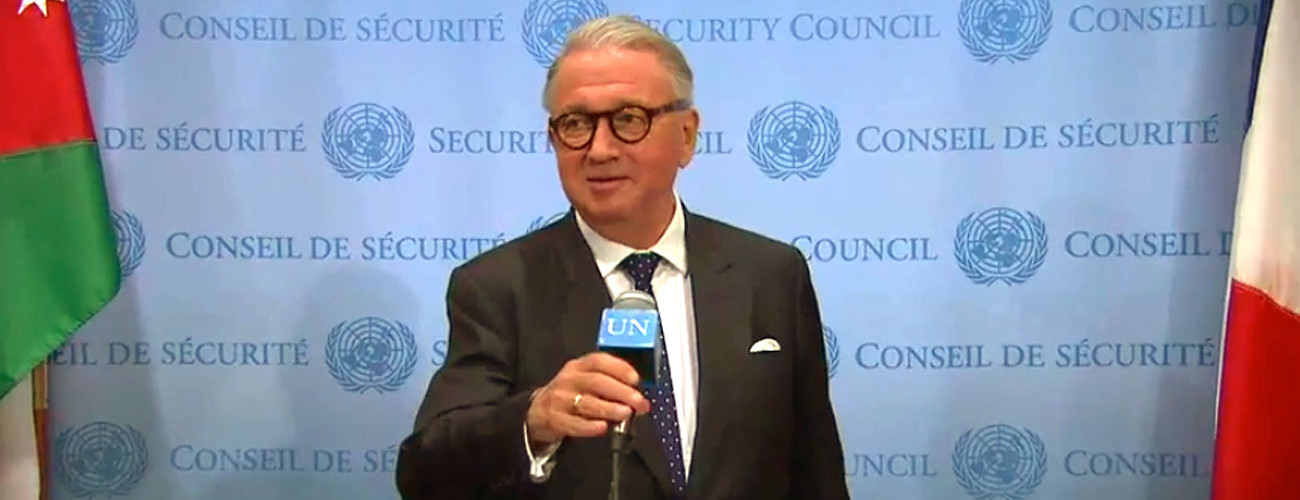United Nations Special Envoy Terje Rød-Larsen addresses media at the UN Security Council. April 28, New York City.
The failure of Lebanon’s parliament to elect a new president after a period of almost a year is a “disappointment at best and irresponsible at worst,” according to Terje Rød-Larsen, the United Nations Special Envoy on Security Council Resolution 1559, which was adopted in 2004 and supported Lebanon’s political transformation after the withdrawal of Syrian forces.
Speaking after his semiannual briefing to the Security Council today, Mr. Rød-Larsen, who is also president of the International Peace Institute, said Lebanon had faced significant challenges in the past five years, including hosting 1.2 million Syrian refugees.
While praising its “remarkable resilience” in the face of regional turmoil, he said Lebanon’s political independence also brought with it the responsibility to govern.
“I find it difficult to understand the justification that some use for their refusal to attend parliament, preventing others from voting as a result,” Mr. Rød-Larsen said. “This goes against Lebanon’s constitutional process and robs Lebanese of their democratic rights.
“The presidential election is a Lebanese process, but partisan politics should be put aside for the greater national good and stability and security in Lebanon.”
On April 22, the Lebanese parliament failed to elect a new president for the 22nd consecutive time, after failing to achieve a constitutionally required quorum of parliamentarians. The country has been without a president since May 25 last year.
Transcript:
Let me start by saying that I have just briefed the Security Council on the situation in Lebanon related to Security Council resolution 1559.
Ten years ago, on the 26th of April 2005, all Syrian troops and security personnel withdrew from Lebanon, marking an important historical moment and the beginning of a new era of political independence in Lebanon. It was also a significant step towards the implementation of Security Council resolution 1559, on which, as I said, I have just briefed the Security Council, following the latest report of the Secretary-General.
Lebanon has faced challenges of a different kind for almost five years now. Its security and stability has been jeopardized as a result of the conflict in Syria. It has been a generous host to over 1.2 million Syrian refugees. Its economy has been affected. Nonetheless, Lebanon has demonstrated a remarkable resilience, in part due to its leaders maintaining a political balance on key issues.
It is essential that Lebanese leaders continue to work towards achieving consensus, particularly focusing on issues of national interest and maintaining the policy of disassociation that we have all agreed on. With political independence comes the responsibility to govern.
The failure to elect a president of the republic for almost one full year is a disappointment at best and irresponsible at worst. I find it difficult to understand the justification that some use for their refusal to attend parliament, preventing others from voting as a result. This goes against Lebanon’s constitutional process and robs Lebanese of their democratic rights. The presidential election is a Lebanese process, but partisan politics should be put aside for the greater national good and stability and security in Lebanon.
I know that the international community and the Security Council have repeatedly also voiced their concern. I now call upon Lebanon’s leaders to attend parliament and elect a president without delay. In the increasingly tense neighborhood surrounding Lebanon, including vicious conflicts in Syria, Iraq, Yemen, and Libya, and the rising threat of terrorism and extremism, Lebanon remains, in spite of its vulnerabilities, a model of open society and co-existence in the region.
That is why the Lebanese and the international community have a responsibility to preserve Lebanon from regional turmoil. Lebanon’s resilience cannot be taken for granted. I therefore welcome the unity and vigilance with which the Security Council continues to support Lebanon’s efforts and the full implementation of this resolution.





